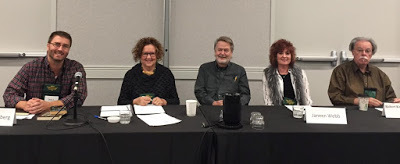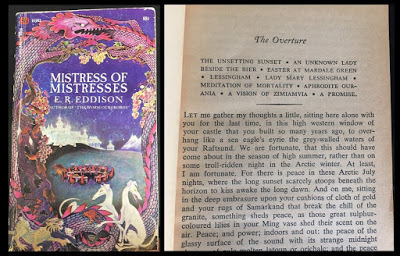World Fantasy Convention 2016 Wrap Up - DIFFICULT FANTASY
World Fantasy Convention 2016 - S. E. Lindberg Summaries:
Author ReadingsWeird Fiction - Darrell Schweitzer and Book HaulThe Eternally Difficult (but Fascinating) Writers Panel <== you are hereSword and Sorcery PanelJohn O'Neill: "My one true love" Black Gate, Dyscrasia, & Sword-n-SorceryWriter-Artist PanelThe Eternally Difficult (but Fascinating) Writers (that was the topic, not a characterization of the panelists :) ) : SATURDAY : 10 AM UNION AB

Seth E. Lindberg (moderator), Kathleen Ann Goonan, Gary K. Wolfe, Janeen Webb, Robert Knowlton
Abstract: The writers who will never be popular but who will never fade away. It has been suggested that at least one person a year will read David Lindsay’s A Voyage to Arcturus with great fascination from now until the end of time. But he will never be popular. Clark Ashton Smith’s prose style repels some and enchants others, but we know he will never sell millions of copies. We don’t mean just neglected writers. What about the “difficult” writers? Does James Joyce’s Finnegans Wake (a dream fantasy of sorts) fall into this category? What is the place for difficult prose styles or ideas which can only reach the few and never the many?
The panel was thoroughly well-read and well recognized. Kathleen Ann Goonan has been nominated for the Nebula Award and author of NY Times Best Seller (Queen City Jazz), and won a John Campbell Memorial Award for Science Fiction. Gary Wolfe has been reviewing speculative fiction for decades including for Locus magazine (since 1991) and even the Chicago Tribune. Janeen Webb hails from Australia known for her contribution to Dreaming Down Under (1999 WFC award winner for anthologies), and several Sinbad novels ~2000-2003 . Lastly, Robert S. Knowlton (aka Bob Hadji, Robert S. Hadji) editor of Borderlands and author and critic of various weird/horror fiction since the 1970's.
Framing the discussion was Brian McNaughton's Throne of Bones (a WFC 1998 award winner). This enabled us to discuss controlling the information flow (and distance from clarity) to a reader via (a) dense prose, (b) auxiliary material maps (or lack of them), (c) increasing accessibility via the spoken spoken word (and audio books), and a litany of authors/books identified that a cryptic but fun:
Sacred Fount - Henry James 1901Clark Ashton SmithDhalgren by Samuel Delany 1975House of Leaves, Mark Danielewski 2000Virginia Woolf ~ 1890-1940Red Shift, Alan Garner 2011A Voyage to Arcturus David Lindsay 1920Finnegans Wake, James Joyce 1939The House on the Borderland, William Hoe Hodgson 1908Gormenghast novels (Titus Groan / Gormenghast / Titus Alone), Mervyn Peake ~1950Robert Coover V, Thomas Pynchon 1963William Morris ~late 1800'sLord Dunsany ~1900 E. H. Visiak
A Challenge from Darrell Schweitzer, program coordinator: Have you Read James Joyce's Finnegans Wake? How can you prove that?
Favorite unscripted moment: Janeen Webb recited, from memory, the beginning to E R Eddison's Mistress of Mistresses. Her voice and tenor were beautiful and it sounded like a blend of poetry and song. Her point being that many of these works are more easily understood, and enjoyed, if read aloud.

Author ReadingsWeird Fiction - Darrell Schweitzer and Book HaulThe Eternally Difficult (but Fascinating) Writers Panel <== you are hereSword and Sorcery PanelJohn O'Neill: "My one true love" Black Gate, Dyscrasia, & Sword-n-SorceryWriter-Artist PanelThe Eternally Difficult (but Fascinating) Writers (that was the topic, not a characterization of the panelists :) ) : SATURDAY : 10 AM UNION AB

Seth E. Lindberg (moderator), Kathleen Ann Goonan, Gary K. Wolfe, Janeen Webb, Robert Knowlton
Abstract: The writers who will never be popular but who will never fade away. It has been suggested that at least one person a year will read David Lindsay’s A Voyage to Arcturus with great fascination from now until the end of time. But he will never be popular. Clark Ashton Smith’s prose style repels some and enchants others, but we know he will never sell millions of copies. We don’t mean just neglected writers. What about the “difficult” writers? Does James Joyce’s Finnegans Wake (a dream fantasy of sorts) fall into this category? What is the place for difficult prose styles or ideas which can only reach the few and never the many?
The panel was thoroughly well-read and well recognized. Kathleen Ann Goonan has been nominated for the Nebula Award and author of NY Times Best Seller (Queen City Jazz), and won a John Campbell Memorial Award for Science Fiction. Gary Wolfe has been reviewing speculative fiction for decades including for Locus magazine (since 1991) and even the Chicago Tribune. Janeen Webb hails from Australia known for her contribution to Dreaming Down Under (1999 WFC award winner for anthologies), and several Sinbad novels ~2000-2003 . Lastly, Robert S. Knowlton (aka Bob Hadji, Robert S. Hadji) editor of Borderlands and author and critic of various weird/horror fiction since the 1970's.
Framing the discussion was Brian McNaughton's Throne of Bones (a WFC 1998 award winner). This enabled us to discuss controlling the information flow (and distance from clarity) to a reader via (a) dense prose, (b) auxiliary material maps (or lack of them), (c) increasing accessibility via the spoken spoken word (and audio books), and a litany of authors/books identified that a cryptic but fun:
Sacred Fount - Henry James 1901Clark Ashton SmithDhalgren by Samuel Delany 1975House of Leaves, Mark Danielewski 2000Virginia Woolf ~ 1890-1940Red Shift, Alan Garner 2011A Voyage to Arcturus David Lindsay 1920Finnegans Wake, James Joyce 1939The House on the Borderland, William Hoe Hodgson 1908Gormenghast novels (Titus Groan / Gormenghast / Titus Alone), Mervyn Peake ~1950Robert Coover V, Thomas Pynchon 1963William Morris ~late 1800'sLord Dunsany ~1900 E. H. Visiak
A Challenge from Darrell Schweitzer, program coordinator: Have you Read James Joyce's Finnegans Wake? How can you prove that?
Favorite unscripted moment: Janeen Webb recited, from memory, the beginning to E R Eddison's Mistress of Mistresses. Her voice and tenor were beautiful and it sounded like a blend of poetry and song. Her point being that many of these works are more easily understood, and enjoyed, if read aloud.

Published on November 06, 2016 09:19
No comments have been added yet.



